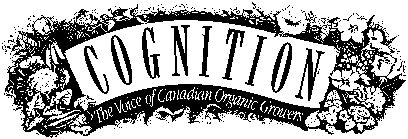

Cognition Index | Virtual Library
| Magazine Rack
Search
| Join the Ecological Solutions Roundtable
FOCUS:
Urban Agricultureby Scott McWhinnie
My neighbour Mrs. Fiore was the mother of urban agriculture, at least in this neck of the woods. I was convinced when I was much younger that she was "Mama Bravo" of canned goods fame, not only because of the food connection but I swear she looked exactly like her. She moved away a few years ago and her backyard has become just another lawn, a sad green monocultural tombstone with that familiar epitaph "Killex." I think she moved because the garden needed to expand although she seemed to have no trouble feeding her family of six from a 50' x 50' lot . She always managed to generate a surplus as well, some of which ended up in a bag on our back porch. One day my father and Mrs. Fiore were talking Tomatoes or rather they were relating the concept of Tomato through the thick of their respective accents. About an hour later a shovel and a rake bobbed past our window and before we could get our boots on there were a couple of rows of beefsteaks behind the garage. Our instructions were "Sheep ‘behind’ e no too much water". We couldn’t believe the result that exploded from eight plants and one sentence of instruction. And the taste!! Lately we’ve traded our "sheep behind" for compost but on that day the torch was passed. I nominate Maria Fiore as the first inductee into the Urban Agriculture Hall of Fame.
The topic of urban agriculture was the subject of a March 1994 paper by Alette Willis called "Urban Food Production in Canada and its Potential Contribution to Rational Agri-Food Systems", which is available from the COG library and was the inspiration for this article. It is unfortunate that, by the irrational nature of urban design, we have left ourselves sitting on top land that is best suited for agricultural usage. Alette contends that it is time for the reversal of this trend but not by bulldozing suburbia, yet. Urban agriculture has the potential to aid in the development of a rational and sustainable food strategy for Canada if we empower ourselves to take back our food supply from the spectre of agribusiness and return it to the people. What is the sense in importing garlic from China, four for a buck, when we work fuel x distance x handling charges x unknown production methods into the equation? Lettuce from the agri-mines of California! Rubber balls posing as tomatoes from Mexico! This is not to say we Canadians are detached from this, considering the degradation of our land base and the exodus of rural people to the city continue. The "culture" in agriculture is replaced by agri-food industry, regulated by boards, committees and NAFTA. In this mind set, Captain Flavr-Savr makes meal time great! Choosy farmers choose BST to build a better bovine! And Chocolate Frosted Sugar Bombs pass as food! I sink into the quagmire of Organic Boy on the defensive.
Do you recall the insanely popular Earth Buddy of last year? That little stocking full of sawdust and grass that every kid HAD to have? The Rubik’s Cube of 1994? I think a valuable lesson was lost on a million kids when Earth Buddy’s hair eventually turned to a wispy dandruff of mold and he was tossed into the composter (hopefully). Kids could be encouraged to grow an incredibly diverse number of plants in their backyards, in their rooms or in Earth Buddy’s head. Yet what are they so excited about? Grass! The "organic" pavement of suburbia. Such a worthy goal, a perfect weed free lawn, brought to us by 2,4-D, Mecoprop and Dicamba. The chemical villains would be no match for Mrs. Fiore however. Come back, Maria! Suburbia is anxiously awaiting your return!
Copyright © 1995. Scott McWhinnie
Reprinted with permission. All rights reserved.
Info Request | Services | Become EAP Member | Site Map
Give us your comments about the EAP site
Ecological Agriculture Projects, McGill University (Macdonald
Campus)
Ste-Anne-de-Bellevue, QC, H9X 3V9 Canada
Telephone:
(514)-398-7771
Fax:
(514)-398-7621
Email: info@eap.mcgill.ca
To report problems or otherwise comment on the structure of this site, send mail to the Webmaster